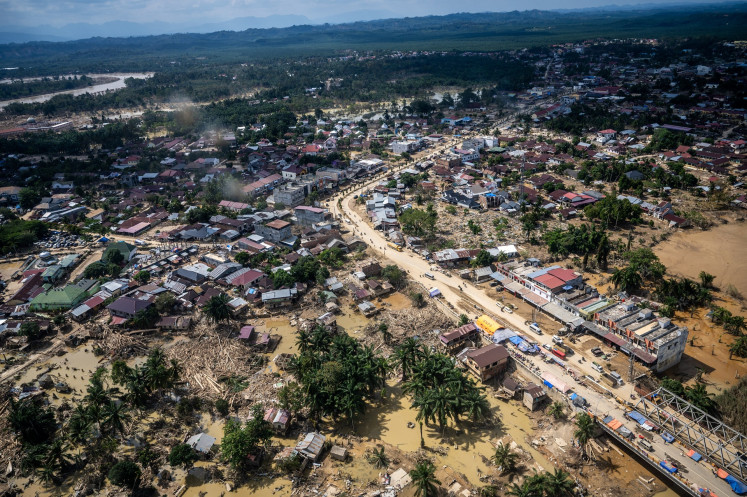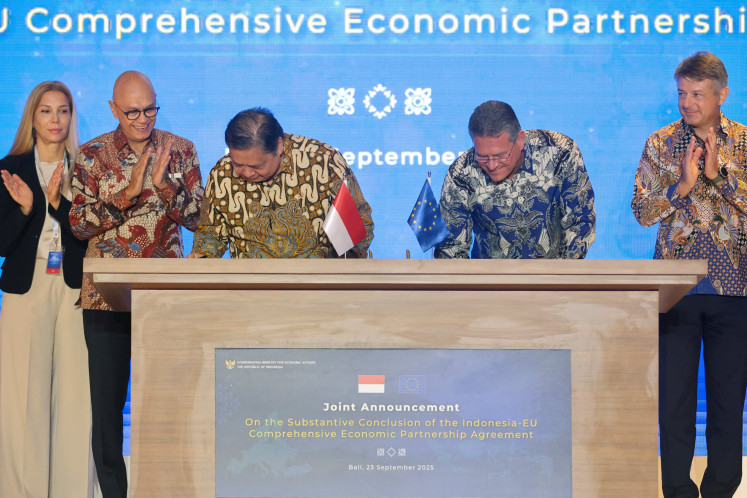Popular Reads
Top Results
Can't find what you're looking for?
View all search resultsPopular Reads
Top Results
Can't find what you're looking for?
View all search resultsASEAN remains relevant for Indonesians
ASEAN started out 50 years ago as a regional initiative for peace and stability, characterized by informality, flexibility, consensus and a non-confrontational bargaining style through a series of consultations, dialogues and exclusive interpersonal contacts among its member states’ officials
Change text size
Gift Premium Articles
to Anyone
A
SEAN started out 50 years ago as a regional initiative for peace and stability, characterized by informality, flexibility, consensus and a non-confrontational bargaining style through a series of consultations, dialogues and exclusive interpersonal contacts among its member states’ officials.
While this “ASEAN Way” has been credited for ushering in decades of peace, this type of engagement has also resulted in an elite-centered approach, with limited mechanisms to accommodate the people. This is unfortunate given that the involvement of the broadest range of stakeholders is crucial for the future of ASEAN.
It was not until the 2007 ASEAN Charter that ASEAN formally recognized the notion of “...a people-oriented ASEAN in which all sectors of society are encouraged to participate in, and benefit from, the process of ASEAN integration and community building.” Now, 10 years later, with all the anticipation and celebration of ASEAN’s 50th anniversary, how well has this “people-oriented” narrative translated to the people?
Indonesia, as the most populous country among the 10 member states of ASEAN, shows a relatively positive trend toward the regional organization. Based on a study conducted by the Economic Research Institute for ASEAN and East Asia (ERIA) and The Habibie Center, entitled ASEAN@50: Retrospective & Perspectives on the Making, Substance, Significance & Future of ASEAN, the majority of Indonesian respondents were familiar with ASEAN-related issues. Their awareness and familiarity of ASEAN was mostly derived during their school years, starting from secondary-level education onwards.
This high degree of awareness is crucial, as a lack of awareness may translate into pessimism, skepticism and rejection of the project of ASEAN integration. The majority of these respondents — academics, students, NGO activists, business representatives and government officials — believe there exists a sense of solidarity among the countries and citizens in the region.
This solidarity translates into the feeling of being better accepted in ASEAN societies than those from outside Southeast Asia. Although accepting this idea, NGOs and business communities argued that their sense of belonging in ASEAN depended on the extent to which the association could help address their concerns and interests.
The study also showed that regional issues, such as the South China Sea, terrorism, human rights violations and development gaps in ASEAN, remain the most pressing concerns among Indonesians. The ASEAN Economic Community has also challenged their belief in Indonesia’s capability to compete with the rest of the region.
However, in terms of ASEAN and its activities, a very good signal was shown by the people themselves: many of the respondents were interested in learning more about the association.
Unfortunately, information on ASEAN and its activities is considerably limited because of the media’s reluctance to cover ASEAN’s progress, achievements and challenges. Indonesian respondents in the study felt that the national media was either too focused on domestic issues or only interested in sensational or negative news.
Amid those concerns, almost 90 percent of the people involved in the study believed that Indonesia’s membership in ASEAN was a good thing. With a population of more than 250 million, Indonesia stands to be the biggest beneficiary from ASEAN cooperation. Opportunities have emerged from its membership, be they political, economic or social.
Interestingly, despite all the benefits that ASEAN has offered, the business representatives share the common view that Indonesia has not utilized its membership in ASEAN effectively. Nevertheless, respondents to the survey expressed greater concern about any prospect of Indonesia leaving ASEAN, fearing losing out on the benefits that ASEAN affords the country.
The positive attitude from the people toward ASEAN signals that in the 50th year of Indonesia’s membership in ASEAN, Indonesians still consider the grouping relevant. ASEAN’s grand idea of a people-oriented association, as articulated in the ASEAN Charter, is arguably beginning to show tangible results, at least among Indonesian respondents.
However it remains the case that ASEAN is still widely regarded as an elitist association. Our study has shown that the people are ready for what ASEAN has for them. They have high hopes and expectations for the association. They know what it is lacking. The question is whether the elites of ASEAN are ready to give them the space to be more involved.
_________________________
Askabea Fadhilla and Alexander C. Chandra are a researcher and associate fellow, respectively, at The Habibie Center, Jakarta.









